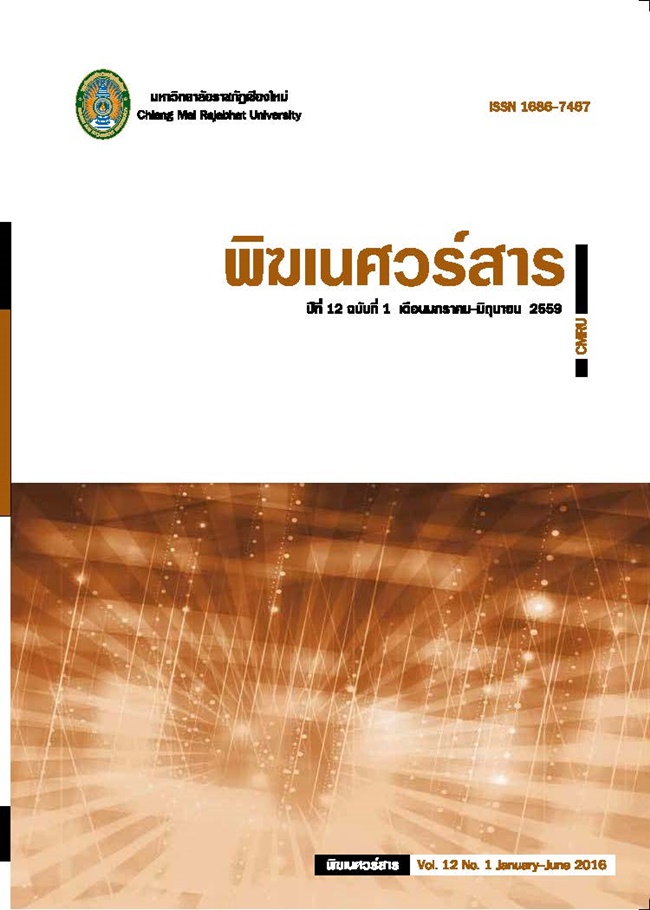การพัฒนารูปแบบการนิเทศแบบเพื่อนช่วยเพื่อนแก่อาจารย์โรงเรียนสาธิต แผนกอนุบาล มหาวิทยาลัยราชภัฎเชียงใหม่
Main Article Content
Abstract
การวิจัยครั้งนี้ มีวัตถุประสงค์เพื่อพัฒนารูปแบบการนิเทศแบบเพื่อนช่วยเพื่อนแก่อาจารย์โรงเรียนสาธิต แผนกอนุบาล มหาวิทยาลัยราชภัฏเชียงใหม่ และเพื่อศึกษาผลการนิเทศแบบเพื่อช่วยเพื่อน ที่มีต่อการจัด การเรียนการสอน ระเบียบวิธีวิจัยเป็นการวิจัยเชิงปฏิบัติการแบบมีส่วนร่วม โดยใช้เทคนิคแบบผสมระหว่าง การวิจัยเชิงปริมาณและเชิงคุณภาพ ประชากรในการวิจัย ได้แก่ อาจารย์พี่เลี้ยงจากภาควิชาการศึกษาปฐมวัย อาจารย์โรงเรียนสาธิต ครูพี่เลี้ยง นักศึกษาฝึกประสบการณ์วิชาชีพครู ผู้ปกครองและนักเรียนชั้นอนุบาล 1 - อนุบาล 3 ปีการศึกษา 2558 เครื่องมือที่ใช้ในการเก็บรวบรวมข้อมูลประกอบด้วย แบบทดสอบ แบบสอบถาม แบบประเมิน แบบบันทึก และกรอบประเด็นสนทนากลุ่มเป้าหมาย การวิเคราะห์ข้อมูล ใช้การวิเคราะห์เชิงเนื้อหา และการวิเคราะห์ทางสถิติ เพื่อหาค่า ความถี่ ค่าร้อยละ ค่าเฉลี่ย ค่าส่วนเบี่ยงเบนมาตรฐาน และการทดสอบค่าที (t-test)
ผลการวิจัยพบว่า การพัฒนารูปแบบการนิเทศแบบเพื่อนช่วยเพื่อน “S-SOSS Model” มีลักษณะเป็นกระบวนการ 5 ขั้นตอน ได้แก่ ขั้นค้นหาจุดแข็ง ขั้นเสริมแรงแบ่งปัน ขั้นขยันสังเกต ขั้นนิเทศแก้ปัญหา และขั้นพัฒนารูปแบบ และมีการกำหนดพฤติกรรมหลัก 5 ลักษณะ ได้แก่ ทดลองวิธีใหม่ ๆ ค้นคว้าเพิ่มเติม เรียนรู้ผู้เรียน จัดการความรู้ และแบ่งปันฉันท์มิตร ทุกขั้นตอนและทุกพฤติกรรม มีระดับการปฏิบัติมากถึงมากที่สุดหลังการดำเนินงานนิเทศ การนิเทศแบบเพื่อนช่วยเพื่อน ส่งผลให้คะแนนทดสอบความรู้ความเข้าใจของอาจารย์โรงเรียนสาธิต หลังการดำเนินงานนิเทศ แตกต่างจากก่อนการดำเนินงานอย่างมีนัยสำคัญทางสถิตที่ระดับ 0.05 สถานศึกษามีระดับ การปฏิบัติในการดำเนินงานนิเทศเพิ่มสูงขึ้นจากระดับพอใช้เป็นระดับดี ผู้ปกครองมีความพึงพอใจในด้านการจัด การเรียนการสอนเพิ่มสูงขึ้น ผู้เรียนมีผลการประเมินตามมาตรฐานหลักสูตรการศึกษาปฐมวัย มาตรฐานการประเมินคุณภาพภายใน และมีผลการเรียนรู้ที่สอดคล้องกับหัวข้อการนิเทศของอาจารย์ผู้สอน ในระดับมากกว่า ร้อยละ 90.00 ในทุกด้านของพัฒนาการ
The Development of Peer Coaching Supervision Model for Demonstration Pre – school Teachers Chiangmai Rajabhat University
The purposes of this study were to study the result of peer coaching supervision to pedagogical and to develop peer coaching supervision model of Chiangmai Rajabhat University Demonstration Pre-school. The participatory action research was employed by using both qualitative and quantitative techniques. The target groups used were the mentors from Department of Early Childhood Education, the teacher staff, the teacher assistants, the pre-school student teachers, the parents and pre-school children of kindergarten 1, 2 and 3 in 2015 academic year. The instruments used were the teachers, a questionnaire, an evaluation format, a field note format and an agenda for focus group discussion. The quantitative data analyzing was conducted by using computer program to identity frequency, percentage, arithmetic mean, standard deviation and t-test values.
The result in developing of peer coaching supervision model “S-SOSS Model” shown the characteristic of 5 steps in process function : searching, sharing, observing, solving problem and setting up model. Those 5 steps was designed to work together with 5 key behaviors : trying new methods, searching more information, learning from learners, knowledge management and sharing together. The result of peer coaching supervision to the knowledge of peer coaching of coach teacher shown the differences between post-test and pre-test score in 0.05 level significances. There were conducted higher peer coaching model practices from moderate level up to good level. The parents’ opinions to the school educational setting were higher. The result of learner evaluation by using pre-school curriculum standard together with the internal quality assurance criteria and indicators and the learning result of learner from peer coaching classroom shown as more than 90.00 percentage level in all aspects of development.
Downloads
Article Details
The articles published are copyrighted by the Graduate School, Chiang Mai Rajabhat University.
The opinions expressed in each article of this academic journal are solely those of the individual authors and do not reflect the views of Chiang Mai Rajabhat University or its faculty members. The responsibility for the content of each article rests entirely with the respective authors. In the event of any errors, the authors alone are responsible for their own articles.


